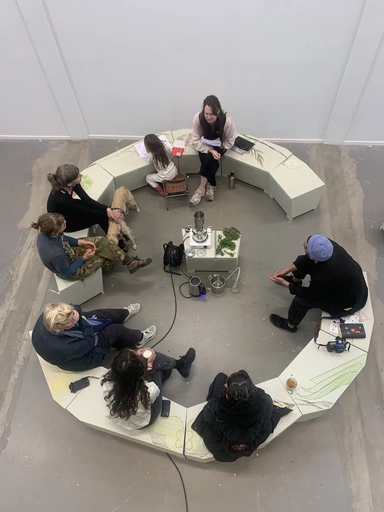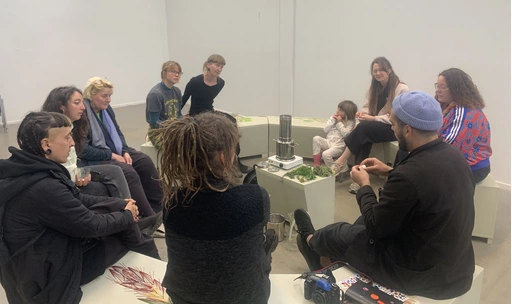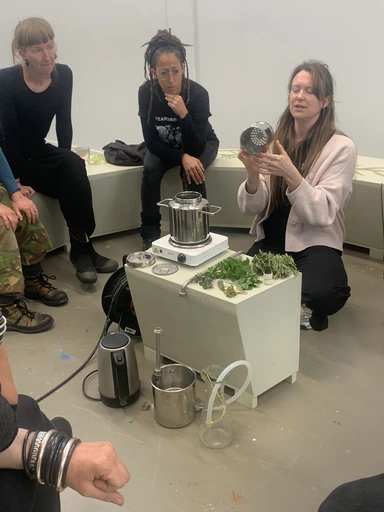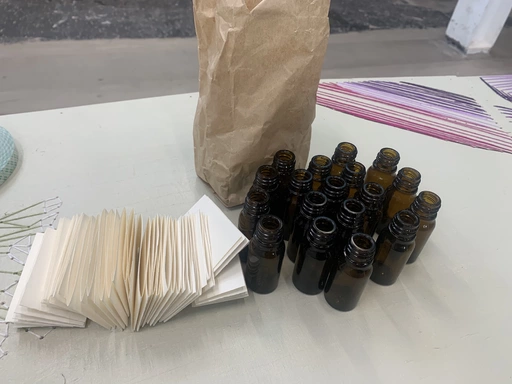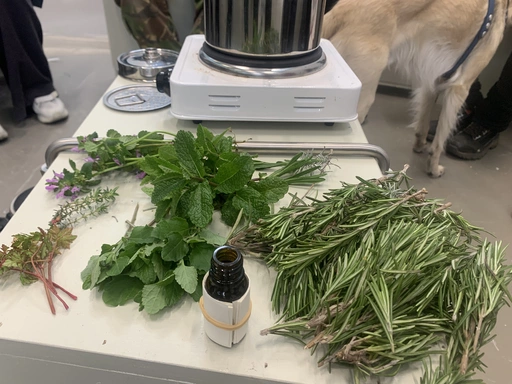
Spring is in the air and with it caried on the wind is scent of various medicinal plants that are in bloom.
This week I was pleasantly surprised to hear that medicine was being explored at the Basecamp. Garage School of Medicine, led by Kari Robertson and Santiago Pinyol. A sweet couple with their 5-year-old daughter.
Spring is in the air and with it caried on the wind is scent of various medicinal plants that are in bloom. From the floating dandelions and cherry blossoms to the delicate purple flowers that sit on top rosemary stocks, each breath of air is rich and wholesome.
This week I was pleasantly surprised to hear that medicine was being explored at the Basecamp. Garage School of Medicine, led by Kari Robertson and Santiago Pinyol. A sweet couple with their 5-year-old daughter.
While Santiago was in the kitchen peeling vegetables, I asked him to explain to me what their program was about. “We’re going to do a community apothecary session, which basically comes from the tradition of doing remedies together. We are popularising and sharing ways of making medicine and remedies which are folk traditions that are homemade and that also have a relationship with radical herbalism. Spaces like Movement In Time, in Glasgow, places that work with communities in vulnerable positions. Like immigrants, asylum seekers, etc so as to build the idea of herbalism with social justices.”
“How do you create social justice through this?” I asked.
“Ah as I said, were taking inspiration from projects which already exists which are already doing this. They make remedies and they take them to refuges, homeless people and encampments, making medicine accessible and mixing it with herbalism which is just getting medicine and remedies out of plants and flowers.
But what we’re going to be doing is making a hydrosol, which is a similar process to making an essential oil. So, we’re going to go out and forage some plants. We’re especially we’re looking forward to doing something with rosemary because rosemary is good for memory. In the context of the Basecamp we were interested in the idea of memory, in this moment of change and also in connection to the idea of grief and hospicing. We’re also going to be reading some texts which talks about how to understand this moment in history, especially in the Goble North. The text is Hospicing Modernity Facing Humanity’s Wrongs and the Implications of Social Activism. By Vanessa Machado de Oliveira. We will be reading a part that talks about, through the metaphor of the house and modernity, how it is a moment for change and how a part of that change has to do with grief and with grieving this moment and letting it go.”
This comment drew me back a bit in time, to the research I was conducting, in this same building, on Letting Go at the end of 2024 during BAK’s ending phase. What was a sad and painful transition at the time for the BAK team, has ultimately led to creating space for this current Basecamp. Basecamp which has sprung up and is taking shape a from within the previous BAK institution. A space where subjects and themes that were being deliberated in academic, political, and intuitional contexts, the memories which are now being drawn upon into a practical testing ground at the Basecamp. These kinds of transitions need special care and time for checking in during various metamorphosis phases of healing and the Garage School of Medicine sessions are a practical reminder of that.
Another text read was from the book Inflamed by Rupa Marya & Raj Patel. “In it they talk about the idea of deep medicine which is a critique on Western medicine. Western medicine isolates the problem in the person and disconnects us from the context. It individualises medicine and dose not look at root social causes. For example, diagnosing poverty as a disease, oppression as a disease and looking at how these things affect the body and the social body in many ways and how trauma becomes a part of you and your genetic material. It’s very difficult to let go of these kind of things. It’s not about healing these things, but hospicing and letting what needs to die, die.” Shared Santiago Pinyol
Kari Robertson jumps in to share a bit more about the Metabolic Literacies, which is a term from Vanessa Machado de Oliveria’s book, mentioned above, and the collective she is part of called Gesturing Towards Decolonial Futures, based in Canada. She works with the idea that usually in our imaginary there’s two possible of ways if thinking, the individual and the collective (individualism and collectivism). She poses a third way which comes through, predominantly coming from indigenous cosmology and culture, which is metabolism.
“We are trying to think through this idea of what it means to kind of think about an institution that is in a significant transition or at the end of something and how can we think about trying to develop literacy to imagine how to compost what is and how to imagine what comes next? Metabolic process, where we try to, where possible, to mix theoretical thinking with a really hands on practice.
The first workshop we did was called Shit and Exhaustion, and it was around reading this chapter about what do you do with literal shit and what do you do with your waste and about how in western society we literally and metaphorically we flush it, and we don’t want to see it again and we don’t want to think about it. At the same time as reading the text we invited the participants to ferment/pickle some carrot sticks, we also left the jars open while we did the readings and the conversations.
The idea was that we also infused our breath and our ideas into the jars, working with bacteria in this process can then be taken home, eaten and eventually it become shit. This act was like moving between the metaphor and material all the time and kind of playing with this dynamic. This idea partly comes from the poet CA Conrad, who has this practice of infusing their food with ideas, with words, with music. They would make a salad and then play a song to the salad for like an hour or two to kind of infuse the salad with the song. So, we kind of played with the idea of how do you metabolise the text that your reading? How do you think of metabolising words, turning them into material and then metabolise that material again.”
“This time, as mentioned above, were working with the concept of collective memory and distilling memory. What pieces do you take from what is, what do you want to retain and what do you let go of? Thinking about that question through distillation processes of hydrosol composed of rosemary, which is strongly associated with cognitive function, focus, memory.”
To be honest, after hearing of all of this, these processes sound a bit strange, yet appealing and easily accessible. Even though I have no medical background, I can in some ways grasp what Kari Robertson and Santiago Pinyol are sharing and practicing. It’s especially welcomed as I haven’t come across many examples in the western context for supporting or hospicing during a time of metamorphoses. Let’s face it, we need to go through phases of metamorphoses in our society and personal lives, even though it might be uncomfortable and painful. We might be more willing and choose to do so if we collectively create soft, safe spaces and processes of care for these phases of transition to take pace. When we embrace this metabolic process during these metamorphoses, perhaps we will shift both individually and collectively into letting go of the shit from the past, collectively re-imagine the future and playfully creating and enacting wholesome practices together.
So don’t be surprised if you catch me singing or whispering to my food the next time you see me at a collective meal.
